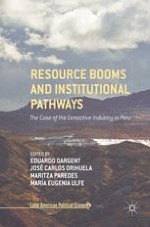
2017 | OriginalPaper | Buchkapitel
1. Cycle of Abundance and Institutional Pathways
verfasst von : Eduardo Dargent, José Carlos Orihuela, Maritza Paredes, María Eugenia Ulfe
Erschienen in: Resource Booms and Institutional Pathways
Aktivieren Sie unsere intelligente Suche, um passende Fachinhalte oder Patente zu finden.
Wählen Sie Textabschnitte aus um mit Künstlicher Intelligenz passenden Patente zu finden. powered by
Markieren Sie Textabschnitte, um KI-gestützt weitere passende Inhalte zu finden. powered by